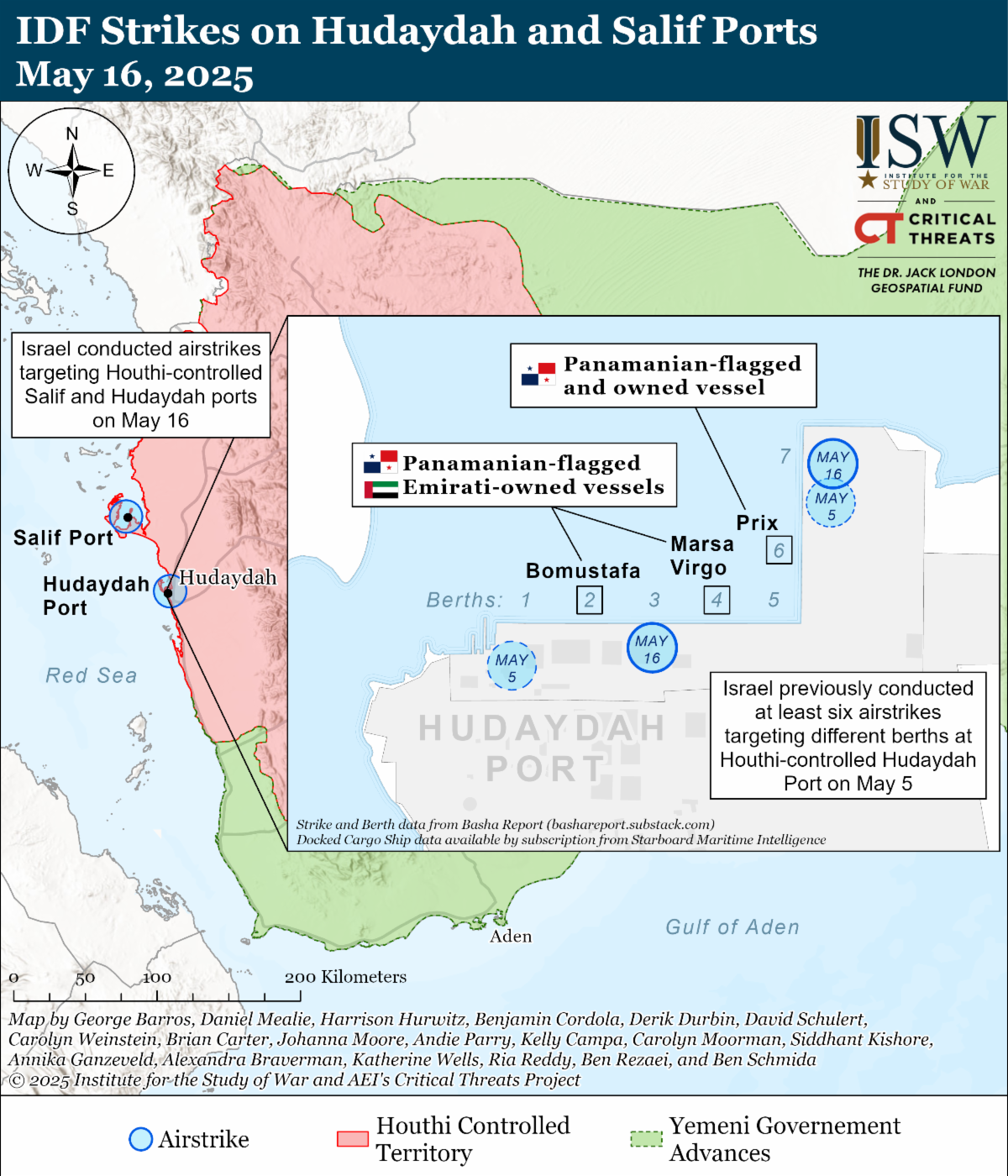Israel targeted Houthi-controlled al Salif and Hudaydah ports on May 16 as part of an Israeli campaign to disrupt the Houthi ability to enable attacks targeting Israel. Israeli Prime Minister Benjamin Netanyahu stated after the airstrikes on May 16 that Israel will continue to strike Houthi targets “including [Houthi] leadership and all infrastructure that enables [the Houthis] to attack [Israel].” The Houthis have repeatedly targeted Israel’s main airport, Ben Gurion Airport, to support Hamas in the Gaza Strip by imposing an “economic blockade” on Israel. The Houthis have launched four ballistic missiles targeting Ben Gurion Airport since May 12. The Israel Defense Forces (IDF) intercepts many of these missiles with its ballistic missile defenses, but some missiles have penetrated Israeli defenses.
The IDF targeted Salif and Hudaydah ports likely because the Houthis use these ports to generate revenue and smuggle weapons that they use to launch drone and missile attacks targeting Israel. The United Nations, through the UN Verification and Inspection Mechanism, inspects vessels in Djibouti before the vessels offload cargo at Yemeni ports. UN ambassadors have previously warned that there has been a surge in Iranian ships bypassing international inspections and offloading uninspected cargo at Hudaydah Port since 2023. The solid fuel missiles, which Iran smuggles to the Houthis and the Houthis use to target Israel, cannot be disassembled for transit and then reassembled. The challenges inherent in transporting these missiles mean that Iran needs to move solid fuel missiles on larger vessels that presumably require more robust port facilities than smaller dhows commonly used to smuggle weapons to the Houthis. The Palestine-2 and Zulfiqar solid fuel ballistic missiles that the Houthis use to strike Israel are 10 meters long, for example, which makes them more difficult to transport on small dhows. The IDF previously targeted Hudaydah Port on May 5, which decreased the port's capacity by 50 percent, according to the Basha Report. The Basha Report estimated that the May 16 airstrikes reduced the port's capacity by an additional 10 to 20 percent.
The Houthis probably forced cargo vessels to stay at Hudaydah Port after the Israeli evacuation notices on May 14 to discourage Israeli airstrikes on certain areas of Hudaydah Port. The IDF also published evacuation orders for the Hudaydah, Salif, and Ras Issa ports on May 11 and May 14. The IDF struck near berth three and seven on May 16, according to the Basha Report. Two Panamanian-flagged, Emirati-owned vessels and one Panamanian-flagged and -owned vessel were docked at berths two, four, and six, according to Starboard Maritime Intelligence and Basha Report. A Comoros-flagged vessel was also at Hudaydah Port, north of berth seven. The Houthis were reportedly not allowing the vessel at berth four to leave the port, which is consistent with Starboard Maritime Intelligence data. Starboard‘s data indicates that the vessel at berth four arrived on May 15 and did not leave before the time of the strike. The Houthis have previously employed a similar strategy and held vessels hostage at Houthi-controlled ports as leverage with international actors. All four vessels in and around Hudaydah Port at the time of the strike previously stopped at Djibouti Port, suggesting that the vessels complied with the UNVIM inspections regime described above.
Key Takeaways:
- Israeli Strikes on Houthi-Controlled Ports: The Houthis probably forced cargo vessels to stay at Hudaydah Port after the Israeli evacuation notices on May 14 to discourage Israeli airstrikes on certain areas of Hudaydah Port. Israel targeted Houthi-controlled al Salif and Hudaydah ports on May 16 as part of an Israeli campaign to disrupt the Houthi ability to enable attacks targeting Israel. The IDF targeted Salif and Hudaydah ports likely because the Houthis use these ports to generate revenue and smuggle weapons that they use to launch drone and missile attacks targeting Israel.
- ISIS Recruitment Efforts in Syria: The Islamic State is attempting to use discontent with the Syrian transitional government among Salafi-jihadi hardliners to undermine the government and expand recruitment. The Islamic State likely hopes to exploit discontent with the transitional government’s ideological moderation and cooperation with the United States. This Islamic State recruitment drive is likely an attempt to further infiltrate transitional government-controlled areas of Syria.
- Iranian-backed Iraqi Parties Remain Divided: The IRGC Quds Force commander probably traveled to Iraq to ensure alignment among Iranian-backed Iraqi parties ahead of the Arab summit, particularly over engagement with Syria and the invitation to Shara. The Iraqi political debate over the Iraqi prime minister’s decision to invite Syrian Transitional President Ahmed al Shara to the Arab Summit in Baghdad on May 17 illustrates the continued divisions within the Shia Coordination Framework.
- Iran Seeks Debt Reimbursement from Syria: Iranian efforts to secure Syrian debt reimbursement through Iraqi mediation probably does not represent a change in Iranian hostility towards Damascus, though it does illustrate Iran’s economic fragility and need for funds. It is unlikely that Iranian-backed Iraqi politicians would be able to compel the Syrian government to repay its debt to Iran. The Syrian government would also almost certainly prioritize reconstructing Syria over repaying Iran because Iranian money made serious contributions to Syria’s destruction.
- Iran and Turkey in Iraq: Iran and Iranian-backed Iraqi actors will likely begin the first phase of a pressure campaign to compel Turkey to withdraw from northern Iraq. The IRGC Quds Force commander reportedly discussed applying political and diplomatic pressure on Turkey to withdraw from Iraq during meetings with key pro-Iran political leaders. Iran and Iranian-backed Iraqi leaders may use force to compel Turkey to withdraw from northern Iraq if the diplomatic and political efforts fail.
- Iranian Nuclear Negotiations: Iran and the E3 (the United Kingdom, France, and Germany) met in Istanbul, Turkey, on May 16 to discuss the US-Iran nuclear negotiations and snapback sanctions. This is the first meeting between Iran and the E3 since the start of US-Iran nuclear talks.
| 




 [ISW] 러시아의 공세 캠페인 평가, 2025년 5월 16일
[ISW] 러시아의 공세 캠페인 평가, 2025년 5월 16일